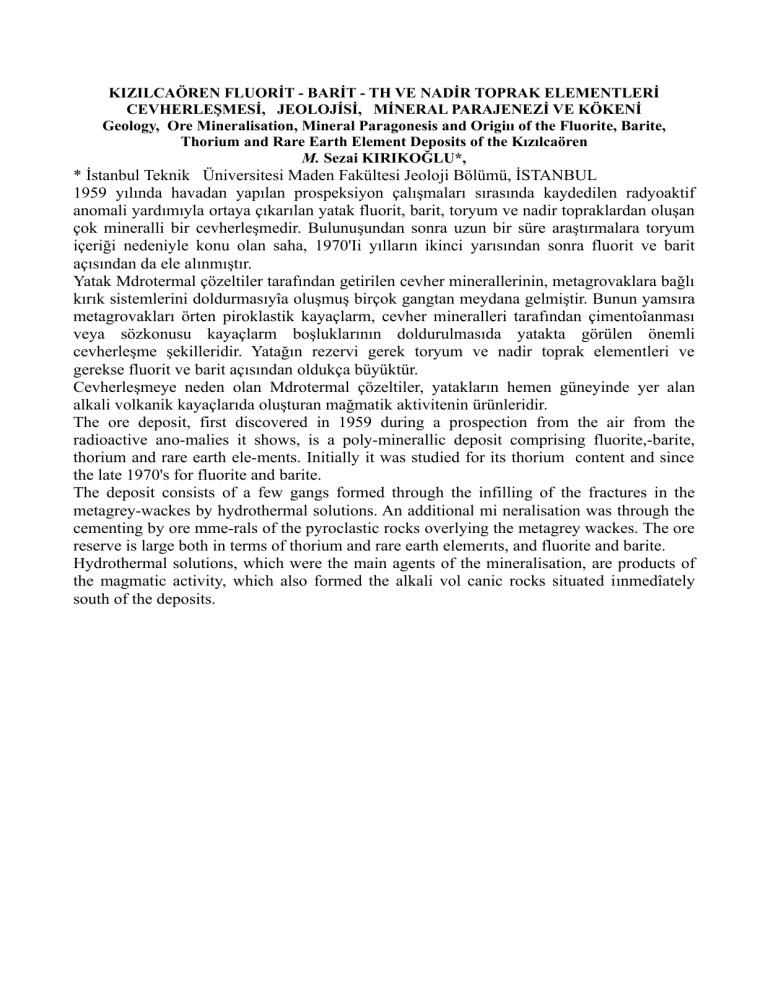
KIZILCAÖREN FLUORİT - BARİT - TH VE NADİR TOPRAK ELEMENTLERİ
CEVHERLEŞMESİ, JEOLOJİSİ, MİNERAL PARAJENEZİ VE KÖKENİ
Geology, Ore Mineralisation, Mineral Paragonesis and Origiıı of the Fluorite, Barite,
Thorium and Rare Earth Element Deposits of the Kızılcaören
M. Sezai KIRIKOĞLU*,
* İstanbul Teknik Üniversitesi Maden Fakültesi Jeoloji Bölümü, İSTANBUL
1959 yılında havadan yapılan prospeksiyon çalışmaları sırasında kaydedilen radyoaktif
anomali yardımıyla ortaya çıkarılan yatak fluorit, barit, toryum ve nadir topraklardan oluşan
çok mineralli bir cevherleşmedir. Bulunuşundan sonra uzun bir süre araştırmalara toryum
içeriği nedeniyle konu olan saha, 1970'Ii yılların ikinci yarısından sonra fluorit ve barit
açısından da ele alınmıştır.
Yatak Mdrotermal çözeltiler tarafından getirilen cevher minerallerinin, metagrovaklara bağlı
kırık sistemlerini doldurmasıyîa oluşmuş birçok gangtan meydana gelmiştir. Bunun yamsıra
metagrovakları örten piroklastik kayaçlarm, cevher mineralleri tarafından çimentoîanması
veya sözkonusu kayaçlarm boşluklarının doldurulmasıda yatakta görülen önemli
cevherleşme şekilleridir. Yatağın rezervi gerek toryum ve nadir toprak elementleri ve
gerekse fluorit ve barit açısından oldukça büyüktür.
Cevherleşmeye neden olan Mdrotermal çözeltiler, yatakların hemen güneyinde yer alan
alkali volkanik kayaçlarıda oluşturan mağmatik aktivitenin ürünleridir.
The ore deposit, first discovered in 1959 during a prospection from the air from the
radioactive ano-malies it shows, is a poly-minerallic deposit comprising fluorite,-barite,
thorium and rare earth ele-ments. Initially it was studied for its thorium content and since
the late 1970's for fluorite and barite.
The deposit consists of a few gangs formed through the infilling of the fractures in the
metagrey-wackes by hydrothermal solutions. An additional mi neralisation was through the
cementing by ore mme-rals of the pyroclastic rocks overlying the metagrey wackes. The ore
reserve is large both in terms of thorium and rare earth elemerıts, and fluorite and barite.
Hydrothermal solutions, which were the main agents of the mineralisation, are products of
the magmatic activity, which also formed the alkali vol canic rocks situated iınmedîately
south of the deposits.
